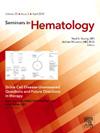Implications for metabolic disturbances in myelodysplastic syndromes
IF 5
3区 医学
Q1 HEMATOLOGY
引用次数: 0
Abstract
The Myelodysplastic Syndromes (MDS) are heterogeneous stem cell malignancies clinically characterized by bone marrow dysplasia, peripheral blood cytopenias, and a high risk for transformation to acute myeloid leukemia. In early stages of disease, differentiation defects and maturation blocks result in deficient hematopoiesis. In higher risk disease, unrestricted proliferation of immature blast cells leads to leukemogenesis. Disease pathogenesis can be attributed to many factors including chronic inflammation that is driven in part by commonly found somatic gene mutations (SGM) fostering expansion of malignant clones while suppressing normal hematopoiesis. Cellular metabolism that both directly and indirectly regulates hematopoietic stem cell (HSC) fate, is intimately connected to the immune system, is altered by MDS somatic gene mutations and is likely is a major contributor to disease pathophysiology. Despite this likely role in pathobiology, there is an underwhelming depth of literature on the subject and the precise metabolic dysregulations in these myeloid malignancies have yet to be fully delineated. In this review, we will provide a general overview of several major metabolic processes and how each directs HSC fate, provide a summary of metabolic studies in MDS, discuss how common SGM and inflammation influence metabolic pathways to drive bone marrow failure, and end with a discussion of standards of care and how these should be carefully considered in the context of metabolic dysregulation.
骨髓增生异常综合征代谢紊乱的影响。
骨髓增生异常综合征(MDS)是一种异质性干细胞恶性肿瘤,临床特点是骨髓发育不良、外周血细胞减少以及极易转化为急性髓性白血病。在疾病的早期阶段,分化缺陷和成熟障碍会导致造血功能缺陷。在高风险疾病中,未成熟的胚泡细胞不受限制地增殖会导致白血病的发生。疾病的发病机制可归因于多种因素,其中包括慢性炎症,而慢性炎症的部分驱动因素是常见的体细胞基因突变(SGM),这种突变在抑制正常造血的同时促进了恶性克隆的扩增。细胞代谢直接或间接调控造血干细胞(HSC)的命运,与免疫系统密切相关,MDS体细胞基因突变改变了细胞代谢,很可能是疾病病理生理学的主要因素。尽管MDS在病理生物学中可能起着重要作用,但有关这一主题的文献深度却远远不够,而且这些髓系恶性肿瘤中确切的代谢失调尚未完全阐明。在这篇综述中,我们将概述几种主要的代谢过程以及每种代谢过程如何引导造血干细胞的命运,总结 MDS 中的代谢研究,讨论常见的 SGM 和炎症如何影响代谢途径以导致骨髓衰竭,最后讨论护理标准以及如何在代谢失调的背景下仔细考虑这些标准。
本文章由计算机程序翻译,如有差异,请以英文原文为准。
求助全文
约1分钟内获得全文
求助全文
来源期刊

Seminars in hematology
医学-血液学
CiteScore
6.20
自引率
2.80%
发文量
30
审稿时长
35 days
期刊介绍:
Seminars in Hematology aims to present subjects of current importance in clinical hematology, including related areas of oncology, hematopathology, and blood banking. The journal''s unique issue structure allows for a multi-faceted overview of a single topic via a curated selection of review articles, while also offering a variety of articles that present dynamic and front-line material immediately influencing the field. Seminars in Hematology is devoted to making the important and current work accessible, comprehensible, and valuable to the practicing physician, young investigator, clinical practitioners, and internists/paediatricians with strong interests in blood diseases. Seminars in Hematology publishes original research, reviews, short communications and mini- reviews.
 求助内容:
求助内容: 应助结果提醒方式:
应助结果提醒方式:


